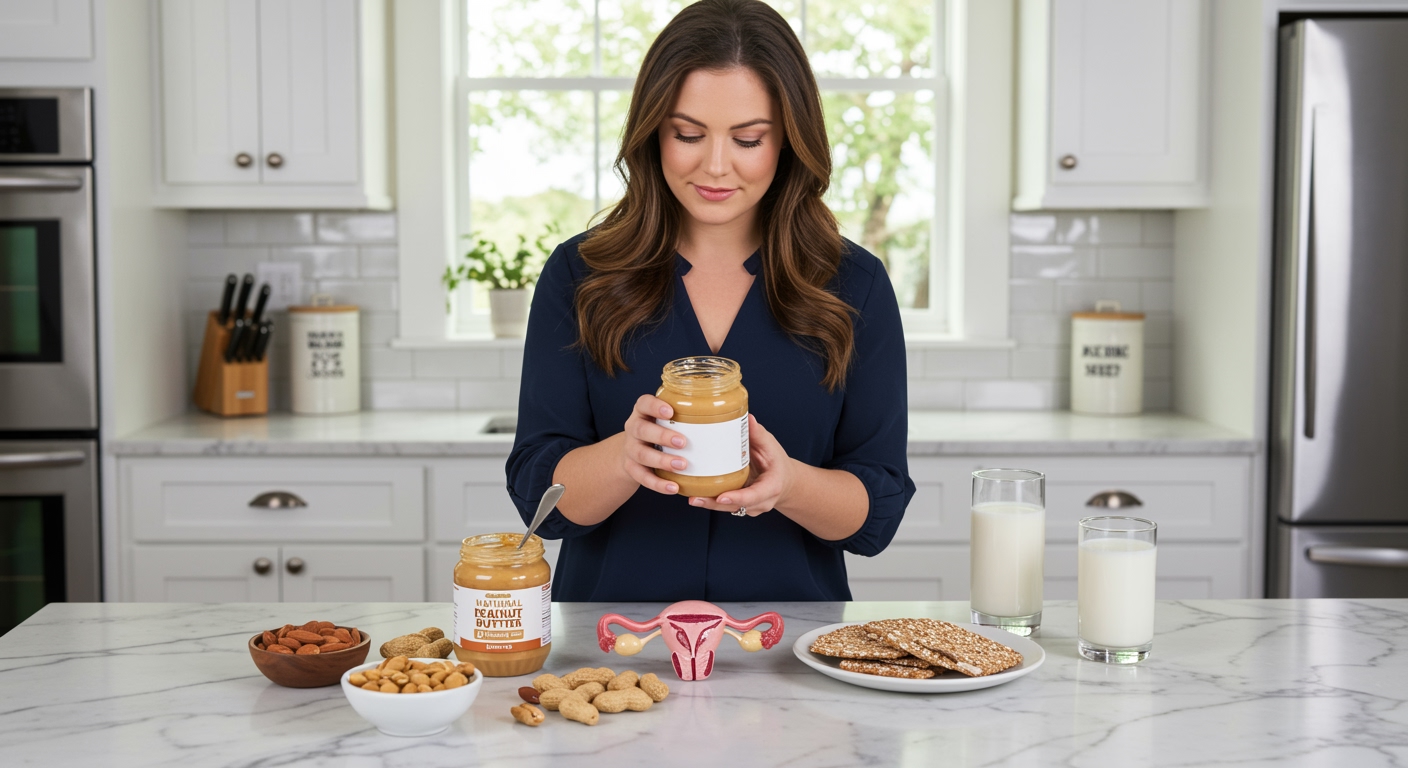✪ Key Takeaway: Natural peanut butter can benefit PCOS when eaten in moderation, but processed versions with added sugars worsen symptoms.
Introduction
You grab that jar of peanut butter from your pantry and wonder if this creamy delight will help or hurt your PCOS symptoms.
Many women with PCOS feel confused about peanut butter because they hear conflicting advice from different sources about whether this popular spread supports or sabotages their health goals.
Hi, I am Abdur, your nutrition coach and today I am going to explain exactly how peanut butter affects PCOS and which types you should choose for better hormone balance.
Does Peanut Butter Affect Insulin Resistance?
Insulin resistance drives most PCOS symptoms, and peanut butter can either help or harm this condition depending on the type you choose.
Natural peanut butter contains healthy fats and protein that slow down sugar absorption and prevent blood glucose spikes.
The monounsaturated fats in peanuts help your cells respond better to insulin, which reduces the hormone chaos that fuels PCOS symptoms.
However, commercial peanut butter loaded with added sugars and hydrogenated oils creates the opposite effect by triggering insulin surges.
These processed versions contain high fructose corn syrup and palm oil that worsen insulin resistance and increase inflammation throughout your body.
Research shows that women with PCOS who eat foods with healthy fats experience better glucose control and reduced cravings compared to those who avoid fats completely.
✪ Pro Tip: Always choose peanut butter with only peanuts and salt listed in the ingredients.
What Nutrients In Peanut Butter Help PCOS?
Natural peanut butter provides several key nutrients that directly support hormone balance and reduce PCOS symptoms.
Magnesium in peanuts helps regulate insulin sensitivity and reduces inflammation that worsens ovarian dysfunction.
The vitamin E content acts as a powerful antioxidant that protects your ovaries from oxidative stress caused by elevated androgens.
Peanut butter also contains niacin, a B vitamin that supports healthy cholesterol levels and improves blood flow to reproductive organs.
The protein content helps stabilize blood sugar levels and keeps you feeling full longer, which prevents the constant snacking that disrupts hormone patterns.
Additionally, the healthy fats support the production of hormones like progesterone and help your body absorb fat-soluble vitamins that are crucial for reproductive health.
✪ Fact: Two tablespoons of natural peanut butter provide about 25% of your daily magnesium needs.
How Much Peanut Butter Is Safe For PCOS?
Portion control becomes critical with peanut butter because even the healthiest version contains high calories that can lead to weight gain.
Two tablespoons per day represents the maximum amount that most women with PCOS should consume to avoid excess calorie intake.
This serving size provides approximately 190 calories and 16 grams of fat, which fits well within a balanced PCOS diet when planned properly.
Eating peanut butter with fiber-rich foods like apple slices or whole grain crackers further slows digestion and prevents blood sugar spikes.
Many women make the mistake of eating peanut butter straight from the jar, which leads to consuming 3-4 servings without realizing the caloric impact.
The timing of consumption also matters – eating peanut butter as part of breakfast or a mid-morning snack works better than consuming it late at night when metabolism slows down.
✪ Note: Measure your peanut butter with a tablespoon rather than eyeballing the portion size.
Which Type Of Peanut Butter Should You Avoid?
Commercial peanut butter brands often contain ingredients that directly worsen PCOS symptoms and should be completely avoided.
Hydrogenated oils create trans fats that increase inflammation and worsen insulin resistance throughout your body.
Added sugars like high fructose corn syrup cause rapid blood glucose spikes that trigger excess insulin production and worsen hormonal imbalances.
Many popular brands also contain excessive sodium levels that can contribute to water retention and bloating commonly experienced with PCOS.
Reduced-fat peanut butter versions often replace healthy fats with sugar and artificial ingredients that provide no nutritional benefit for hormone balance.
Some brands add stabilizers and emulsifiers that may disrupt gut health, which plays a crucial role in hormone metabolism and PCOS management.
Always read ingredient labels carefully and choose products that contain only peanuts and perhaps a small amount of salt for the best PCOS outcomes.
✪ Pro Tip: Natural peanut butter should separate with oil on top, which indicates no stabilizers were added.
The Bottom Line
Natural peanut butter can be a valuable addition to a PCOS-friendly diet when consumed in appropriate portions and chosen carefully.
Quality matters more than quantity when it comes to managing your health through food choices.
I would love to hear about your experiences with peanut butter and PCOS, so please share your questions or thoughts in the comments section below.
References
At NutritionCrown, we use quality and credible sources to ensure our content is accurate and trustworthy. Below are the sources referenced in writing this article:
- PCOS Diva: Ask Amy Peanut Butter and PCOS
- The PCOS Dietitian: PCOS Friendly Fats
- Project Nutrition: Is Peanut Butter PCOS Friendly
- PCOS Meal Planner: Is Peanut Butter Good for PCOS Benefits Best Types





